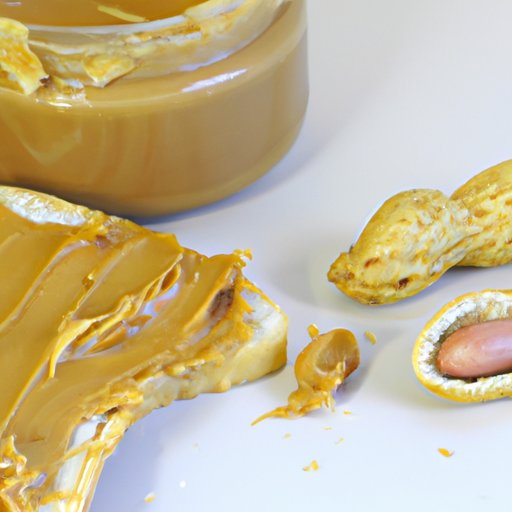Introduction
Peanut butter is a popular snack food that has been enjoyed by people around the world for centuries. It is a versatile spread that can be used in a variety of dishes and recipes. In this article, we will explore the health benefits and risks associated with eating peanut butter and discuss how it can fit into a balanced diet.

Nutritional Benefits of Eating Peanut Butter
Peanut butter is a nutrient-dense food that is packed with essential vitamins and minerals. It is an excellent source of protein, providing 8 grams per 2 tablespoon serving. It also contains healthy monounsaturated and polyunsaturated fats that help to keep your heart healthy. In addition, peanut butter is rich in vitamin E, magnesium, potassium, zinc, iron, and B vitamins.
Exploring the Health Advantages of Peanut Butter
In addition to its nutritional benefits, there are several health advantages associated with eating peanut butter. Studies have shown that regular consumption of peanut butter may reduce the risk of heart disease and stroke. It has also been found to have anti-inflammatory properties that may help to reduce inflammation in the body. Additionally, some research suggests that consuming peanut butter may reduce the risk of certain types of cancer.

The Health Risks Associated with Eating Peanut Butter
Although there are many potential health benefits associated with consuming peanut butter, there are also some potential risks. One of the main risks associated with eating peanut butter is the potential for allergic reactions. People who have a peanut allergy should avoid eating peanut butter. Additionally, peanut butter is high in calories, so it is important to consume it in moderation to avoid weight gain.
Is Peanut Butter a Healthy Choice for Everyday Snack?
When deciding if peanut butter is a healthy choice for an everyday snack, it is important to consider factors such as the type of peanut butter you are consuming, the portion size, and the other foods that you are including in your meal. For example, if you are opting for a natural peanut butter that is low in sugar and salt, then it can be a good snack option. Other healthy snack choices include fresh fruits and vegetables, nuts, yogurt, and whole grain crackers.
How Peanut Butter Can Help You Lose Weight
Although peanut butter is high in calories, it can still be a part of a weight loss plan when consumed in moderation. Substituting peanut butter for unhealthy snacks like chips or candy can help you stay on track with your diet goals. Additionally, making sure that you include other healthy foods in your meals and controlling portion sizes can help you lose weight while still enjoying the occasional peanut butter snack.

The Role of Peanut Butter in a Balanced Diet
In order to maintain a healthy lifestyle, it is important to incorporate a variety of nutritious foods into your diet. Eating peanut butter can be part of a balanced diet, but it should not be the only food you eat. Incorporating other healthy foods such as fruits, vegetables, lean proteins, and whole grains is essential for a healthy diet. Additionally, limiting processed foods and getting adequate exercise can help you reach and maintain a healthy weight.
Conclusion
In conclusion, peanut butter can be a nutritious and delicious addition to your diet when eaten in moderation. Although there are some potential health risks associated with eating peanut butter, there are also many health benefits. When consumed as part of a balanced diet, peanut butter can provide essential vitamins and minerals and may even help reduce the risk of certain diseases. With proper portion control and the inclusion of other healthy foods, peanut butter can be a healthy choice for everyday snacking.
(Note: Is this article not meeting your expectations? Do you have knowledge or insights to share? Unlock new opportunities and expand your reach by joining our authors team. Click Registration to join us and share your expertise with our readers.)
